If you’re like most people, you’ve probably asked yourself this question at least once. Why do you have tiny spiders in your house? Where did they come from? What can you do to get rid of them? Don’t worry, you’re not alone. Tiny spiders seem to be invading homes all across the country! This blog post will explore some of the possible reasons why you might be seeing these little critters and offer some solutions on how to get rid of them.
Where Do These Tiny Spiders Come From?
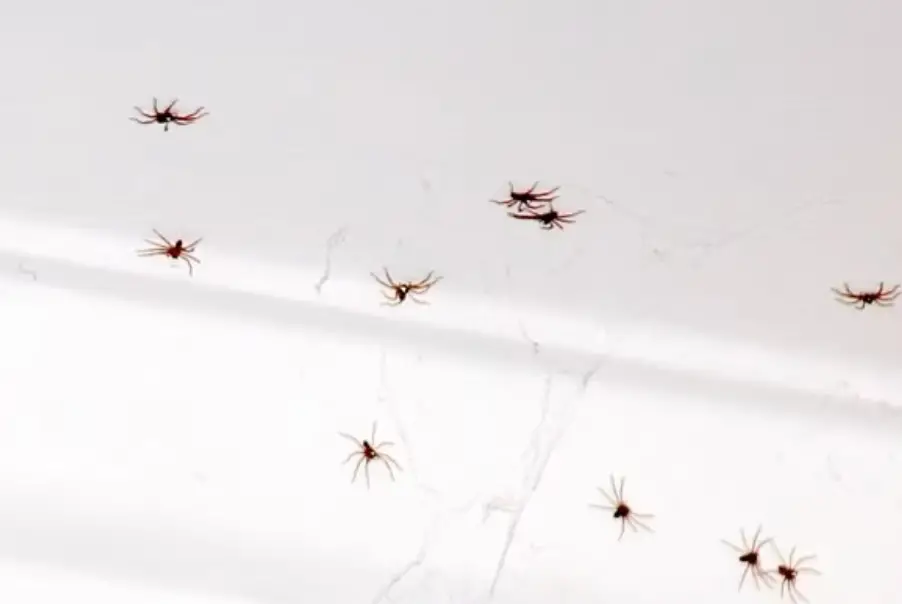
Spiders are attracted to light
Spiders are attracted to light and warmth, so they often move indoors in search of these elements. They may enter through open windows and doors, or cracks and crevices in the walls and roof. Spiders can also be brought inside on items such as firewood, clothes, or boxes.
Outdoors, spiders live in a variety of habitats including gardens, woodlands, and fields. Many species hunt their prey using webs while others actively stalk insects or larger animals. Some spiders also scavenge for dead insects or rely on dew drops to provide them with water.
Spiders are looking for food
Spiders look for a place to live and shelter, as well as food. All adult spiders are predators that eat mostly insects such as ants, flies, and moths. Some species of spiders also eat larger prey such as lizards or even small birds. They locate their food by sensing vibrations in the air or sensing heat from nearby prey. Spiders usually hunt during the night when most of their prey is active and easier to catch.
Spiders are seeking shelter
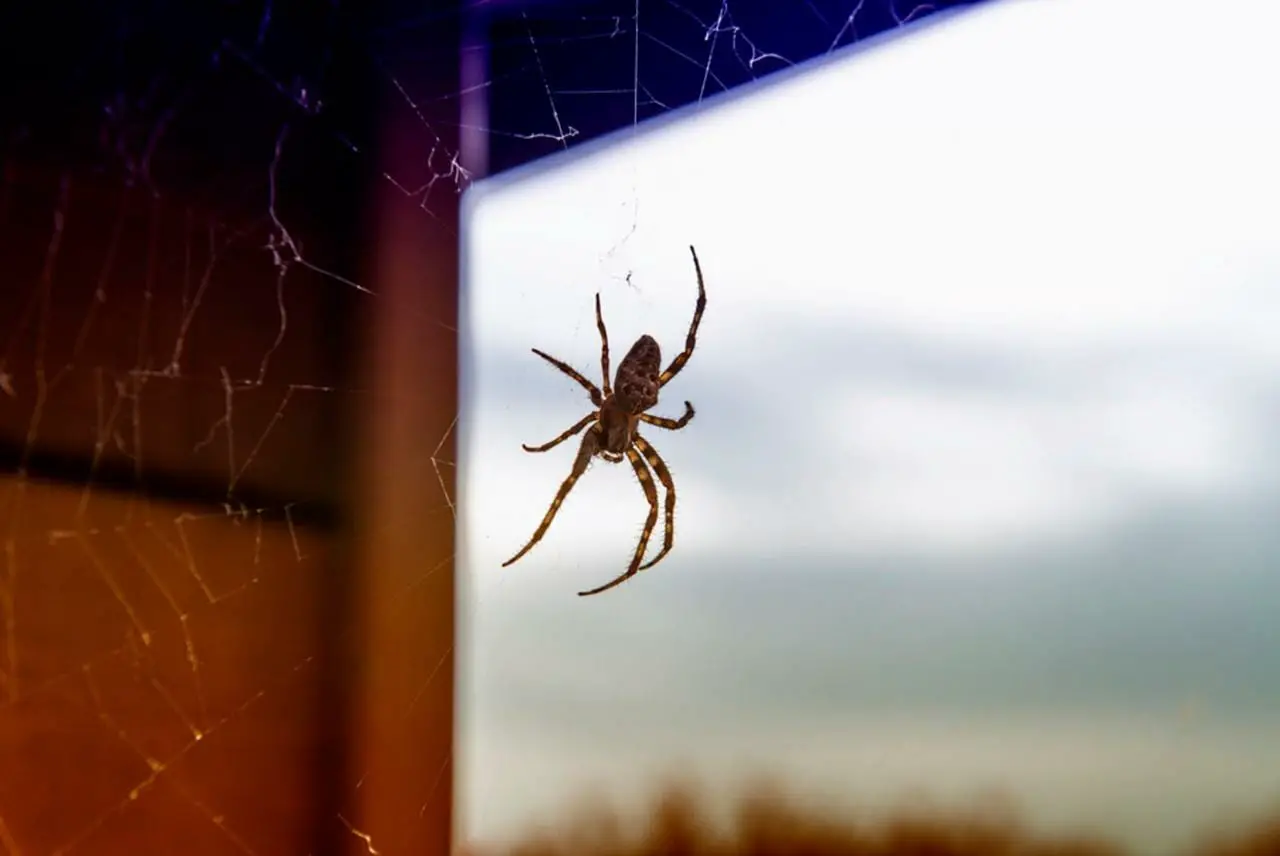
Spiders are seeking shelter as well. Spiders typically look for areas with little or no human activity and plenty of crevices in which they can hide. Common locations include attics, basements, sheds, and garages. Some species even build webs inside the house to trap their prey or protect themselves from predators. In addition to providing a hiding spot, spiders may also use webs to communicate with each other or send out signals about potential dangers in the area.
Spiders follow pheromones
Spiders also use pheromones to find their way. Pheromones are chemical substances that spiders release into the environment. These chemicals help them recognize other spiders in the area, as well as attract potential mates. By releasing these pheromones, they can follow a trail of spider scent and locate new places to live or hunt for food.
You have brought them in yourself
In many cases, spiders may have been brought in by humans. If you are seeing a lot of spiders in your home or business, it could be because you inadvertently brought them inside with furniture, plants, or other items. Spiders also often hide in laundry and other clothing items that are left out for long periods. To prevent this from happening, make sure to inspect any outside items before bringing them into the house or office.
Spider eggs
Finally, spiders may also enter your home by way of their eggs. Female spiders often lay their eggs in warm and protected places such as attics or basements. The eggs will then hatch into tiny spiderlings that can quickly spread throughout the house. To prevent this from happening, be sure to regularly check for spider webs and eggs in any dark corners or crevices of your home or business [1].
What are the most common spider species found in homes?
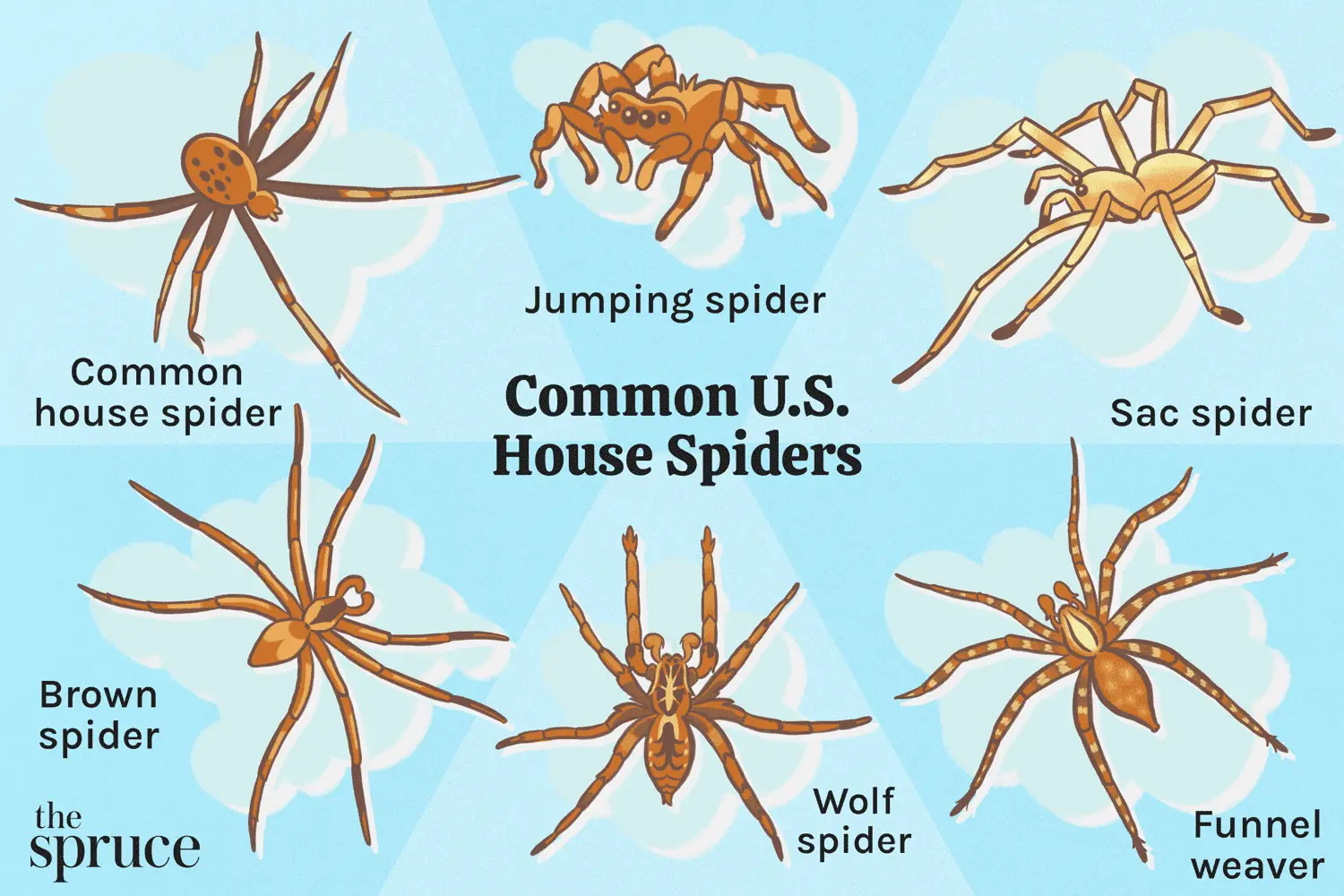
American house spider
The American house spider is the most commonly found species of spider in homes throughout the United States. This species is typically light brown or gray and has a round, bulbous abdomen with white markings near its head. It builds messy webs in corners, windows, and other locations inside the home where it can catch prey.
Wolf spider
Wolf spiders are large hunting spiders that often find their way indoors through open doors or windows. These are fast-moving spiders with dark coloration and distinctive thick fur on their bodies. Wolf spiders prefer to hunt for prey rather than wait in webs for insects to come to them.
Jumping spiders
Jumping spiders are small, active creatures that get their name from their ability to jump long distances when they feel threatened. These spiders have black or brown bodies with bright markings, such as white spots and stripes. They can often be found crawling around window sills in search of prey.
Brown recluse
The brown recluse spider is a species that prefers dark, undisturbed areas like closets, attics, basements, and crawl spaces. This spider has distinctive tan or light brown coloration with a dark violin-shaped marking on its back. Its venom is toxic to humans, so it should not be disturbed if found in the home.
Black widow
The black widow is one of the most well-known spider species due to its unique appearance and potent venom. It has a glossy black body with a distinctive red hourglass shape on its abdomen. Black widow spiders are shy and tend to stay out of sight in dark corners, sheds, and basements. They should be avoided if found in the home.
Yellow sac spider
The yellow sac spider is a species commonly found inside homes throughout the United States. This spider has a pale yellow or white coloration with a black stripe running down its back. It builds small, silken tubes along walls and ceilings where it can hide when disturbed and feed on prey at night.
Daddy long legs
Daddy’s long legs are easily identified by their slender, long legs and small round bodies. These spiders can be found in cupboards, closets, basements, and even bedrooms if allowed to enter. They do not bite humans and will generally run away when disturbed.
Hobo spider
The hobo spider is a species that is native to the Pacific Northwest of the United States but has spread throughout other parts of the country in recent years. This spider has a brown body with yellow markings on its back that resemble an hourglass shape. It builds funnel-shaped webs indoors to catch its prey [2].
General places where spiders use as hiding spots in the house
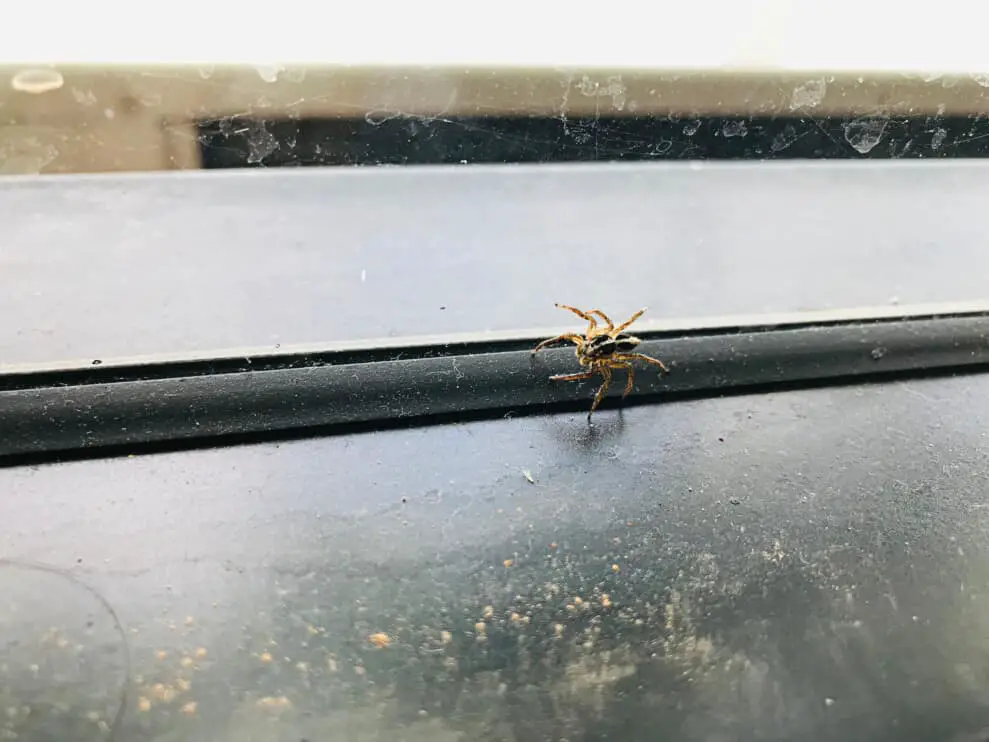
Spiders can be found in many places around the house, such as:
- In corners of ceilings and walls
- Behind window treatments, curtains, and drapes
- Inside furniture crevices or drawers
- Under beds, bedding, mattresses, and sofas
- Behind pictures and mirrors that are hung on the wall
- Around doors and door frames
- Within piles of clothing or clothing items
- In bookshelves or other storage areas
- Inside boxes or containers stored in closets
Attics and basements can also provide a space for spiders to hide.
In addition to these general hiding spots, some spiders may use more unusual areas to hide, such as in folded sheets of paper or between books on a shelf. It is also important to remember that spiders may build webs around the house, which can serve as another hiding spot for them.
Finally, some species of spiders are more likely to hide outdoors than indoors. These include jumping spiders and wolf spiders, which can be found under logs or garden debris. They may also take refuge in cracks and crevices of fences and walls, or inside sheds and garages. To reduce your chances of encountering these types of spiders, it is recommended to keep outdoor areas free from clutter and debris.
Additionally, regular inspection of these areas should be done since spiders could have easily moved into different hiding spots over time.
Ways to Get Rid of A Spider Infestation
Keep your house neat.
Spiders are more likely to infest a house that is cluttered with items and has not been regularly cleaned. Make sure to vacuum any webs or egg sacs, and remove any stray clutter from your home.
Seal the cracks in your home
Spiders can enter your home through cracks, gaps, or other openings in the walls and foundation. Seal up any of these openings to keep spiders out.
Reduce moisture in and around the house
Spiders are attracted to moisture, so make sure to remove any sources of excess water from inside or near your home. This includes repairing leaking pipes and keeping gutters clear of debris that could collect water.
Remove vegetation from the perimeter of your residence
Spiders will often hide in vegetation near your home. Trim back any trees or bushes that are located close to the house, and clear away piles of leaves or other organic material.
Apply a residual pesticide
An insecticide can be applied to the exterior of your home and around entry points to prevent spiders from entering. Make sure to read the label carefully before application, and follow all safety instructions.
Use sticky traps
Sticky traps are an effective way to trap any spiders that have already entered your home. Place the traps in areas where spiders may congregate, such as corners or behind furniture.
Set up a bug zapper
Bug zappers are a great way to eliminate spiders and other insects that may be attracted to your home. Place the zapper in an area where it will receive plenty of airflows, such as near windows or doors. This will help draw the bugs into the zapper, where they will be electrocuted.
Keep outdoor lights off
Spiders and other insects are attracted to lights, so turn off any outdoor lights that may be drawing them near your home. This will help keep spiders away from the house and reduce the chances of an infestation.
Scatter dichotomous earth around your home
Dichotomous earth is a powdery substance that is toxic to spiders. Scatter this powder near entry points or around the perimeter of your home to keep spiders out. Make sure to wear a face mask and gloves when applying, as the dust can be harmful if inhaled.
Use natural oils and vinegar, or drive them nuts with… nuts!
Natural oils such as peppermint or citrus and vinegar can be used to repel spiders. You can also scatter crushed nuts around the perimeter of your home, as the smell is unpleasant to spiders and will keep them away.
Call a pest control professional
If all else fails, call a pest control professional who can identify the type of spider causing the infestation and recommend appropriate treatments for getting rid of them. A qualified exterminator can also offer advice on how to prevent future infestations [3].
How can you prevent tiny spiders from entering your home?
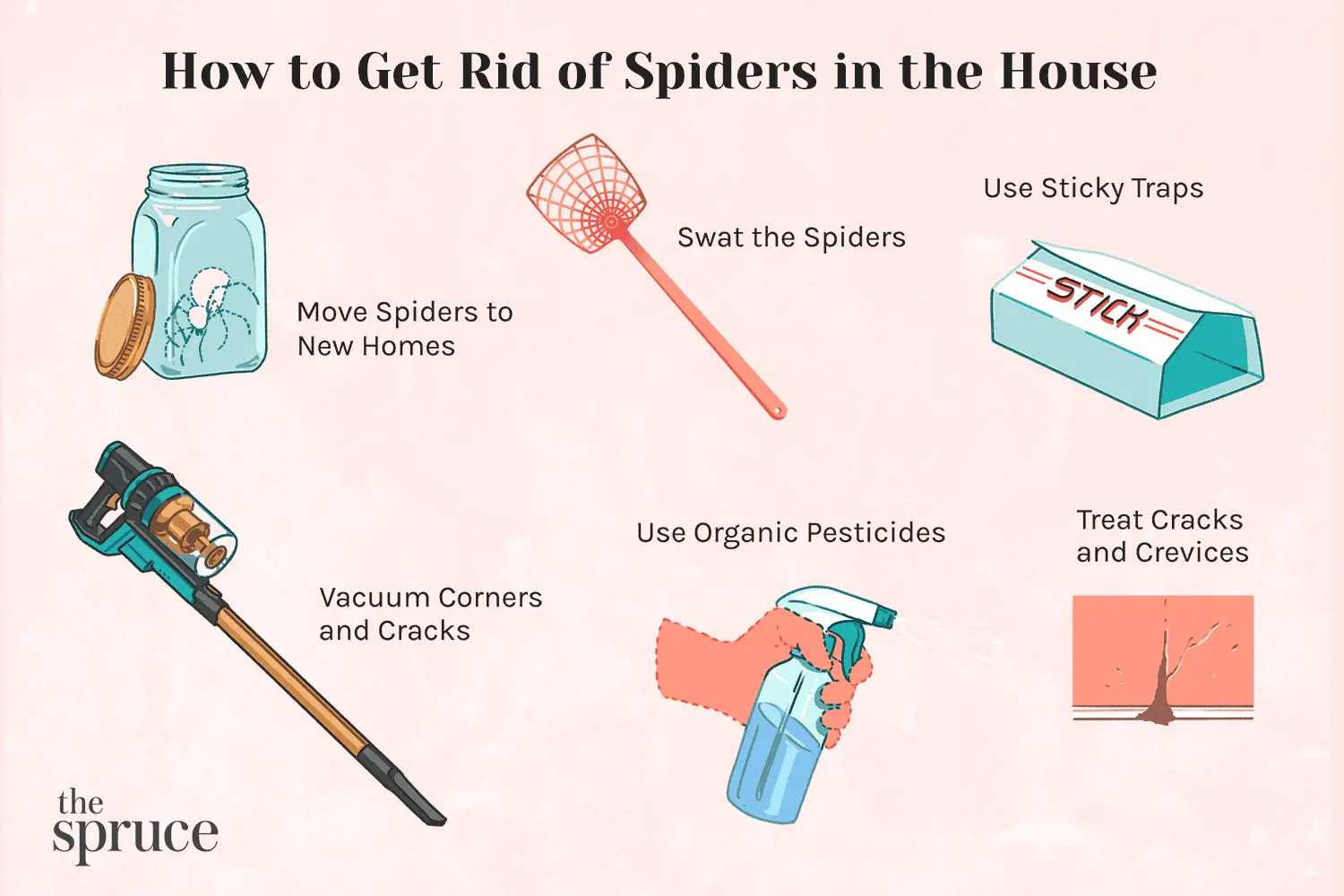
There are several ways to reduce the number of tiny spiders entering your home.
- Seal up any cracks or crevices around doors and windows, using caulk or a weather-stripping sealant. This will make it difficult for spiders to sneak in through these openings.
- Keep outdoor lights off or reduced at night as much as possible, since this is when many spiders look for food sources, such as insects.
- Place sticky traps in areas where you’ve seen tiny spiders before, like near window sills and door frames. These will help catch any that do manage to enter your house.
- Vacuum regularly, especially if you often spot tiny spiders in certain areas of your home. Vacuuming can help remove webs, spider eggs, and other debris that can attract the creatures.
- Store or discard any items such as boxes or furniture that could be harboring tiny spiders or their eggs.
- Use natural repellents like essential oils to make your home less attractive to spiders. Sprinkle peppermint oil, tea tree oil, citronella oil, or eucalyptus oil around windows and door frames as a deterrent for spiders.
- Keep clutter to a minimum so there are fewer places for spiders to hide and build webs inside your house.
- If you have any plants around your home’s exterior, keep them well-trimmed to reduce any spider activity.
Following these tips can help minimize the number of tiny spiders entering your home, and keep you and your family safe from unwanted pests [4].
FAQ
How do I get rid of thousands of tiny spiders?
If you are dealing with thousands of tiny spiders, the infestation is likely coming from an area in or around your home. The best way to get rid of them is to identify where they are originating and take steps to prevent other spiders from entering your home. This could include sealing up any cracks or crevices in windows and doors, removing piles of debris outside your home, and making sure that any outdoor lighting is directed away from the house.
You can also use insecticides to eliminate any existing spider populations, although be aware that this may not be safe for pets or children who may come into contact with these chemicals. It is always best to consult a professional if you have any doubts about how to safely control pests.
Should I kill the small spider in my room?
Killing small spiders in your home is typically not necessary, as they are generally harmless.
Spiders feed on other insects and help to keep the insect population under control. If you’re uncomfortable with having spiders around, there are a few non-lethal ways to get rid of them. You can use a vacuum cleaner to suck them up, or you can try setting up sticky traps near areas where spiders frequent.
Additionally, keeping your house clean and free from clutter will help deter many pests including spiders. If an infestation does occur and the problem persists, it may be best to contact a professional pest control service for assistance. They will be able to advise on the most effective strategies for eliminating any existing spider populations without posing a risk to the occupants of the home.
What to do about baby spiders?
Baby spiders, or spiderlings, can be found in many places around the home. Although they are usually harmless and tend to leave on their own after a few days, it may be necessary to take steps to prevent them from reproducing inside your home. The best way to do this is by removing any potential breeding sites, such as piles of debris or leaf litter.
You can also use insecticidal sprays or gels which contain substances that are toxic to spiders, although these should only be used with extreme caution as some of them may have adverse effects on humans and pets. Additionally, you may want to consider making changes to your home environment so that it is less attractive for spider activity; for example, using weather stripping around windows and doors, and applying caulk to seal cracks and crevices.
What can I do about spiders in my basement?
Spiders in your basement can be a nuisance and should not be allowed to stay there. The first step to dealing with them is identifying where they are coming from and what conditions are attracting them. This could include dampness, piles of debris, or even outdoor lighting that is directed toward the house.
Once you have identified the source of the problem, take steps to eliminate it by sealing up any existing cracks and crevices, removing piles of debris outside your home, fixing any leaks in the basement, and making sure that any outdoor lighting is directed away from your house.
You can also use insecticides to eliminate any existing spider populations, although be aware that this may not be safe for pets or children who may come into contact with these chemicals. It is always best to consult a professional if you have any doubts about how to safely control pests.
Finally, keeping the basement clean and free of clutter will help discourage spiders from setting up residence there in the future. Regular vacuuming and dusting should also help reduce spider activity in the long term.
Do spider mites ever go away?
Spider mites are a common pest that can be difficult to get rid of, but with some patience and dedication, it is possible to control them. The first step is to identify where the mites are coming from and what conditions are attracting them. This could include areas of excessive moisture or high humidity.
Once you have identified the source of the problem, take steps to eliminate it by making sure any existing cracks and crevices in your home are sealed up, reducing humidity levels, and improving ventilation if necessary. You can also use insecticidal sprays or gels which contain substances that are toxic to spider mites, although these should only be used with extreme caution as some of them may have adverse effects on humans and pets.
Additionally, you may want to consider making changes to your home environment so that it is less attractive for spider mite activity; for example, reducing clutter in areas where they might hide or eliminating any sources of food and water. Over time, these efforts should help reduce the population of spider mites in your home.
Why do spiders run at you?
Spiders may run at you if they sense a threat; this is their natural defense mechanism and they believe that running away from the perceived danger will be the best way to survive. It’s also possible that some spiders are simply curious about what or who might be in their vicinity, and so may approach out of curiosity rather than fear.
In any case, it’s usually best to leave them alone and let them go on their way. It’s important to remember that most spiders are harmless and pose no real threat to humans; however, there are some exceptions such as black widows and brown recluses which can cause serious illness or even death if they bite someone.
Do spiders like clean or dirty rooms?
Spiders generally prefer to live in areas that provide them with adequate food and shelter. So, generally speaking, a dirty room full of clutter will likely provide more hiding places and potential sources of food for spiders than a clean one.
However, it is important to remember that spiders do not thrive in environments that are overly damp or humid; so having an area where moisture can be quickly removed may help to keep spider populations down.
Useful Video: What is a House Spider? | Pest Support
Conclusion
Tiny spiders are remarkable creatures that have evolved and adapted to inhabit a wide range of habitats. Whether living in the corner of your bedroom, deep within a cave, or out in the vast open ocean, these diminutive arachnids can be found thriving in almost any environment.
From their silk-producing spinnerets to their complex sensory organs, spiders are capable of an impressive array of behaviors and skills. Spiders are also incredibly important ecologically due to their role as predators, capturing and eating many dangerous pests that could otherwise spread disease or wreak havoc on local species populations.
However, spiders can be harmful to humans as well, and it is important to be aware of their presence and take appropriate precautions.
References
- https://apartmentabc.com/why-do-i-have-loads-of-tiny-spiders-in-my-house/
- https://extension.colostate.edu/topic-areas/insects/spiders-in-the-home-5-512/
- https://smithspestmanagement.com/blog/post/how-to-get-rid-of-spiders/
- https://rac.com.au/home-life/info/rid-spiders-house


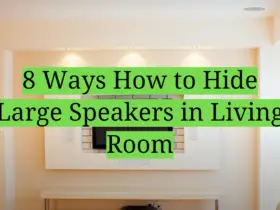


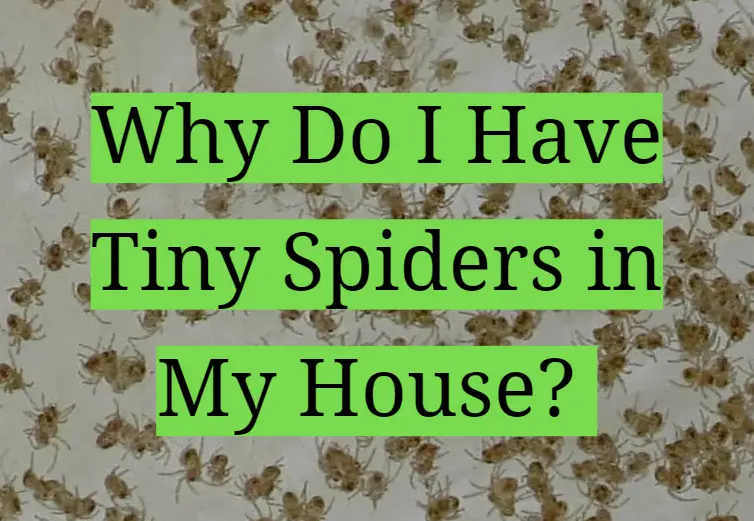








Leave a Reply